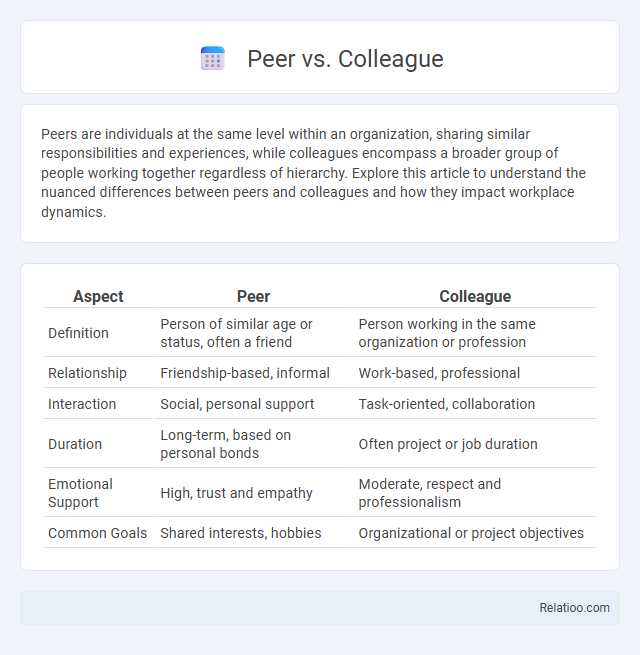Peers are individuals at the same level within an organization, sharing similar responsibilities and experiences, while colleagues encompass a broader group of people working together regardless of hierarchy. Explore this article to understand the nuanced differences between peers and colleagues and how they impact workplace dynamics.
Table of Comparison
| Aspect | Peer | Colleague |
|---|---|---|
| Definition | Person of similar age or status, often a friend | Person working in the same organization or profession |
| Relationship | Friendship-based, informal | Work-based, professional |
| Interaction | Social, personal support | Task-oriented, collaboration |
| Duration | Long-term, based on personal bonds | Often project or job duration |
| Emotional Support | High, trust and empathy | Moderate, respect and professionalism |
| Common Goals | Shared interests, hobbies | Organizational or project objectives |
Understanding the Difference: Peer vs Colleague
Understanding the difference between a peer and a colleague is essential for professional communication and collaboration. A peer refers to someone at the same level or position as you within an organization or industry, while a colleague broadly includes anyone you work with, regardless of their rank or role. Recognizing this distinction enhances your ability to navigate workplace relationships and fosters more effective teamwork.
Defining "Peer" in the Workplace Context
In the workplace context, a peer is an individual who holds a similar position or level of responsibility within an organization, often working collaboratively towards common goals. Unlike a colleague, who broadly refers to any fellow employee regardless of rank or department, a peer specifically denotes equal standing in terms of role or professional status. Understanding this distinction helps clarify workplace dynamics and enhances team communication and collaboration.
Who Qualifies as a "Colleague"?
A colleague is someone who works in the same organization or profession as you, sharing similar roles or responsibilities. While peers may be individuals of equal rank or age within a group, and coworkers simply share the same workplace, a colleague implies a closer professional relationship rooted in common work objectives or field expertise. Understanding who qualifies as your colleague helps clarify workplace dynamics and collaboration opportunities.
Key Characteristics of Peers
Peers share similar roles, responsibilities, and levels of expertise within an organization, fostering collaborative problem-solving and mutual support. They often work together on projects or tasks, contributing equally to achieve common goals and improve team performance. The key characteristics of peers include equal status, shared knowledge, and reciprocal influence, distinguishing them from colleagues or mentors.
Colleagues: Roles and Relationships
Colleagues typically share the same workplace or profession, collaborating on projects and contributing to organizational goals through complementary skill sets. Their roles often involve mutual support, knowledge exchange, and collective problem-solving, which fosters a productive work environment and enhances team dynamics. The relationship among colleagues is characterized by professional respect, shared responsibilities, and a commitment to achieving common objectives.
Peer vs Colleague: Similarities and Distinctions
Peers and colleagues both refer to individuals within a similar professional or social environment, but peers emphasize equal status or shared experiences, while colleagues highlight working relationships within the same organization or field. Your peers are those who share your level or role, facilitating mutual understanding and support, whereas colleagues may encompass diverse roles at different levels collaborating on common objectives. Understanding these distinctions helps clarify interactions, expectations, and professional dynamics in your workplace or social setting.
Collaboration Styles: Peer vs Colleague
Peers typically engage in collaboration based on shared responsibilities and similar roles, fostering equal input and mutual support in problem-solving. Colleagues may have diverse expertise and hierarchical differences, requiring more structured communication and task delegation to maximize productivity. Understanding your collaboration style helps leverage the appropriate dynamics for effective teamwork and project success.
The Importance of Peers in Professional Growth
Peers play a crucial role in professional growth by providing relatable experiences, constructive feedback, and emotional support within the same hierarchical level. Unlike colleagues who may work in different roles or departments, peers share similar challenges and goals, fostering collaborative learning and skill development. Engaging with peers enhances problem-solving abilities, encourages knowledge exchange, and builds a supportive network essential for career advancement.
Navigating Professional Relationships with Colleagues
Navigating professional relationships with colleagues involves understanding the distinct roles of peers and coworkers within the workplace hierarchy and teamwork dynamics. Peers typically share similar job roles or levels, fostering collaboration and mutual support, while colleagues may encompass a broader range of positions within the same organization. Effective communication, boundary-setting, and respect for diverse expertise are key strategies for building productive and harmonious working relationships among all professional associates.
Choosing the Right Approach: Peer or Colleague?
Choosing the right approach between a peer and a colleague depends on the context of collaboration and the specific goals. Peers typically share similar roles or levels within an organization, enabling equal exchange of ideas and mutual support, while colleagues might include a broader range of professionals within the same workplace or industry, offering diverse perspectives and expertise. Understanding the nuances of peer relationships versus colleague interactions enhances teamwork efficiency, project outcomes, and professional development strategies.

Infographic: Peer vs Colleague
 relatioo.com
relatioo.com